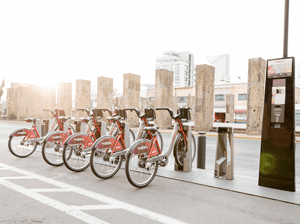 The North American Bikeshare Association (NABSA) reports that there were 50,000 bike share bicycles in the U.S. as of 2016, an increase of 30,000 bikes since 2012. Those bikes made 28 million trips in 2016, a 25 percent increase over 2015, and as of 2017, more than 130 North American cities had bike share programs. A key tenet of bike share culture is the open sharing of data about ridership trends. The purpose of this is to provide transparency and remove barriers to other cities wanting to create bike share programs.
The North American Bikeshare Association (NABSA) reports that there were 50,000 bike share bicycles in the U.S. as of 2016, an increase of 30,000 bikes since 2012. Those bikes made 28 million trips in 2016, a 25 percent increase over 2015, and as of 2017, more than 130 North American cities had bike share programs. A key tenet of bike share culture is the open sharing of data about ridership trends. The purpose of this is to provide transparency and remove barriers to other cities wanting to create bike share programs.
“We are in a pivotal moment for bike share – one where technological advancements make bike share a more accessible form of transportation and easier to use than ever before.” said Executive Director of NABSA, Samantha Herr Tom Nutley, Head of Operations for Stage Intelligence, is on a mission to make bike sharing even more accessible by providing bike share programs with the power of Artificial Intelligence.
Elements of a Successful Bike Share Program
In a recent DATAVERSITY® interview, Nutley said the needs of three groups come into play when planning a bike share solution: The city, the users, and the program operator. “Each city is different, with hundreds of different parameters, such as the amount of public transport available, the number of train and bus stations, the weather, the topography,” he said.
It’s important to consider all factors affecting transportation by bike, and understanding user needs can be a challenge. Users can be stranded when there are no bikes available, or can try to return a bike only to find all the docking stations full. Bike repairs can be an issue if the program operator is unaware of the bike’s condition. Lastly, any bike share program must be tailored to meet the goals and resources of the operator.
The Need for an Intelligent Solution
Bike share ridership fluctuates based on external factors such as weather, events, and holidays, and Nutley said that redistribution of bicycles in response to those factors is 40-60 percent of the operations costs of running a bike share scheme. The need to keep bikes repaired and serviced is also a challenge, yet simply adding more bikes is not the solution. “In reality this does little to increase efficiency and often adds to the problem.” he said.
Rather than being seen just as a fun alternative, bike share operators and the cities where they operate want bike share travel to be seen as a viable part of the transportation system for city residents. “For bike share schemes to be seen as a real public transport solution and a smart answer to urban mobility, they need to work as good or better than existing public transport services,” said Paul Stratta, Director, at Platform for European Bicycle Sharing & Systems (PEBSS), an initiative of the European Cycling Federation (ECF). “People go to bus and railway stations expecting the services to be there, and for them to operate on time. It should be the same with bike share schemes.”
An Industry Awash in Data it Can’t Use
Even with access to a high volume of data, operators have struggled to make use of it due to the need to manage multiple changing variables. Funding for programs has not been widely available until recently, and thus companies had to rely on efficient management and distribution just to survive. “That’s where we came in,” Nutley said. “The volume of data that was freely available, it played a huge role in developing, improving, and training our AI prediction engine.”
Stage Intelligence started with a citywide research project that helped them develop and roll out their AI-based BICO platform. The company is London-based and was able to use one of the largest bike share programs in the world, the London Santander Bike Scheme, as a research model. Stage Intelligence then partnered with the Divvy Bike Share program in Chicago in an effort to see if the use of BICO could increase ridership and better engage its users. “We came in, assessed the scheme, and were able to integrate our BICO platform with their existing systems.” Both sides were impressed with the results: “The Divvy scheme went from a struggling scheme to one of the best that its operator owns,” he said, growing from 2000 bikes to over 6000 without a significant increase in resources. “Our BICO platform was able to optimize its management processes to help them grow rapidly without adding unnecessary costs.”
Building on these successes, Stage Intelligence wanted to explore new markets globally and so made a connection with BKT Bicipública in Guadalajara, finding that they also had been capturing raw data that could be used by the BICO platform. “We found that BICO was a perfect fit for BKT and the Mexican market,” he said.
How BICO Works
BICO uses data to meet the needs of cities, bike share operators and customers by providing access to a real-time understanding of customer experience.
“Our BICO platform allows us to take a deep dive into individual bike share schemes in different cities and neighborhoods around the world and find ways to improve usability within them,” said Toni Kendall-Troughton, CEO at Stage Intelligence.
According to the company, BICO uses Artificial Intelligence to give bike share operators the ability to accurately predict demand for bikes in real time. BICO can evaluate all the docking stations within an easy walking distance and communicate how many bikes are available to any customer at any given time. Drivers are dispatched to areas where bikes are needed via a mobile app so there is no lag between an emerging demand and the ability to meet that demand.
This allows operators to respond to changing needs as well as scale and grow their operation based on accurate data. “Our platform collects a huge amount of data. We churn through petabytes of information within our systems on a daily basis.” This data feeds info to BICO’s AI software, which continually learns and evolves as a result.
“The more data we collect, the better we are able to address the challenges in the industry. Bike share operators can’t be stuck with traditional, one-dimensional management processes. They need to be able to get real-time information and have the capability to react to changing demands,” said Nutley.
As a result, BICO was designed to update every three minutes so operators are able to know where bikes are needed and manage dynamically in a rapidly changing environment.
Although they collect a massive amount of data, Nutley said that a key selling point of the BICO platform is its simplicity and accessibility.
“Our platform sends out simple, easy to understand and automated instructions to distribution teams, while delivering valuable insights to the management team to help them grow their schemes. Data is delivered where and when it’s needed.”
Guadalajara and Mexico Bike Share
 BKT Bicipública manages more than 50,000 bicycles and 3900 docking stations, supporting 160 million trips across Latin America, according to the company. For over a decade, BKT Bicipública has been finding solutions for implementing public bicycle systems within cities, using the most robust technology available. BKT operates the MIBICI system in Guadalajara, its second largest scheme in Mexico, serving a population of over five million people.
BKT Bicipública manages more than 50,000 bicycles and 3900 docking stations, supporting 160 million trips across Latin America, according to the company. For over a decade, BKT Bicipública has been finding solutions for implementing public bicycle systems within cities, using the most robust technology available. BKT operates the MIBICI system in Guadalajara, its second largest scheme in Mexico, serving a population of over five million people.
“Our AI platform is being used to optimize and automate bike share management across the city,” said Nutley – the first time AI has been used in bike share programs in Mexico. “Artificial Intelligence makes it simple to grow a bike share scheme and provide services that create life-long riders. This is a great opportunity for Guadalajara to innovate in clean and sustainable transportation.”
BICO enables cycles to be perfectly distributed across a city, enabling riders to find bikes and docking stations where and when they need them. This drives rider growth, repeat usage and the overall sustainability of bike share schemes, he said.
“Rebalancing is one of our biggest challenges in the operation of the public bicycle system in Guadalajara. BICO has allowed us to take better advantage of our resources to improve our service, focusing our efforts on achieving user satisfaction,” said Noé Santana, Operation Manager at BKT Bicipública.
Nutley said that the successful trial in Guadalajara paved the way for an expansion of the BICO platform across Mexico.
E-Bikes Enter the Market
Nutley commented there is an increasing demand for e-bike management, because there are greater challenges for programs that include powered cycles. Bike Share operators Limebike, Spin, Ford GoBikes and JUMP Bikes (formerly Social Bicycles) will be adding e-bikes to their programs, which marks a shift in the industry, he said. But there are limitations to the adoption of e-bikes due to the public perception that using a powered bike is ‘cheating,’ and the costs of purchase and repairs are much greater than in non-powered bikes.
“E-bikes will need to be charged to ensure that it is ready to be used by the next rider. That requires seamless management of resources and expert understanding of the local market,” he said. Nutley predicts that the market for e-bikes will eventually be higher than pedal-powered bike sharing programs, “putting pressure on operators to deliver each and every time,” a situation tailor-made for AI.
Future Developments
Nutley remarked that the company has exciting plans unfolding in the next few months involving expansion into Europe and other areas throughout the world. Because redistribution of bikes is such a significant portion of bike share cost, he is also looking at solutions to make redistribution even more efficient by developing an app to incentivize redistribution. “If we can create a simple and easy-to-use app that gets the riders to distribute the bikes, it will benefit the cities, operators and the riders.”
Photo Credits: Alex.F/Shutterstock.com and Stage Intelligence
